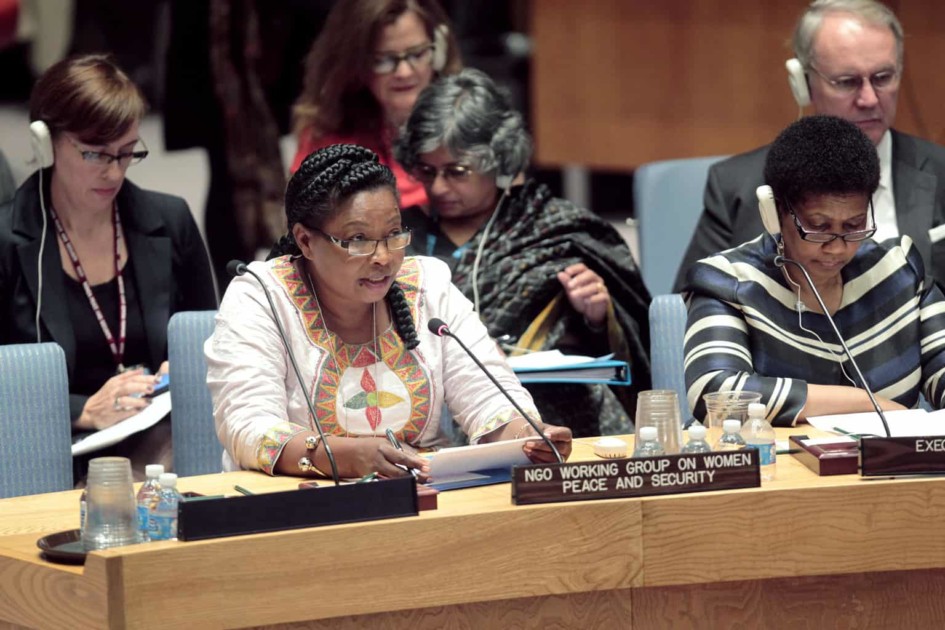Central African Republic
The Central African Republic (CAR) has been engulfed in violent armed conflict since 2013, and conflict-related insecurity has left women and girls vulnerable to forced marriage, abduction, and especially sexual and gender-based violence; according to the International Development Monitoring Centre, 68% of girls in CAR are married before the age of eighteen. Women in the CAR continue to be largely excluded from peacebuilding and reconstruction efforts and have even been subjected to violence perpetrated by UN peacekeepers. Deployed in April 2014, the United Nations Multidimensional Integrated Stabilization Mission in the Central African Republic (MINUSCA)is mandated to protect women, monitor and report on violations against women, adhere to the zero-tolerance policy on sexual exploitation and abuse, ensure women’s full participation in conflict resolution and elections, and incorporate gender as a cross-cutting issue. To further this progress, based on the work of NGOWG members and their partners, the NGOWG advocates for more thorough monitoring of UN peacekeepers in CAR to ensure that no exploitation and abuse occurs on their watch.
Central African Republic
The Central African Republic (CAR) has been engulfed in violent armed conflict since 2013, and conflict-related insecurity has left women and girls vulnerable to forced marriage, abduction, and especially sexual and gender-based violence; according to the International Development Monitoring Centre, 68% of girls in CAR are married before the age of eighteen.
Women in the CAR continue to be largely excluded from peacebuilding and reconstruction efforts and have even been subjected to violence perpetrated by UN peacekeepers. Deployed in April 2014, the United Nations Multidimensional Integrated Stabilization Mission in the Central African Republic (MINUSCA) is mandated to protect women, monitor and report on violations against women, adhere to the zero-tolerance policy on sexual exploitation and abuse, ensure women’s full participation in conflict resolution and elections, and incorporate gender as a cross-cutting issue. To further this progress, based on the work of NGOWG members and their partners, the NGOWG advocates for more thorough monitoring of UN peacekeepers in CAR to ensure that no exploitation and abuse occurs on their watch.
Current and Past Recommendations to the UN Security Council (Monthly Action Points)
The situation in the Central African Republic (CAR) continues to worsen, with civilians bearing the brunt of the conflict, and with human rights violations and abuses in the country amounting to possible war crimes and crimes against humanity. The Council should support the deployment of gender and women protection advisers as recently advocated for in the SC by Phumzile Mlambo-Ngcuka, Executive Director of UN Women, as well as child protection advisers, to focus on violations and abuses committed against women and children, including all forms of sexual violence in armed conflict, as stated in SCR 2121 (2013), ensuring that medical and psychosocial services are available and accessible as per SCR 2127 (2013). The Council should insist on accountability for atrocities committed by all armed groups and security forces operating in the country, and reinforce efforts to ensure justice systems are re-established, with investigations and prosecutions conducted according to international standards. As the Council receives a revised version of preliminary report of the Commission of Inquiry (COI) established to investigate violations of international humanitarian and human rights law in CAR, the specific violations targeting women should be discussed and make sure that the Commission has all the resources and technical support it needs to conclude its work. In particular, the Council should make sure that the Secretary-General speedily appoints the third Commissioner who is now missing. Council members should urge the UN Secretariat to speed up preparations for the full deployment of MINUSCA, which is to take over from MISCA on September 15. In particular, the Council should insist that all possible support is given to MISCA in order both to facilitate its protection of civilians’ activities in the transition period, as well as to better prepare those troops that will be part of MINUSCA.
Relevant Resources






